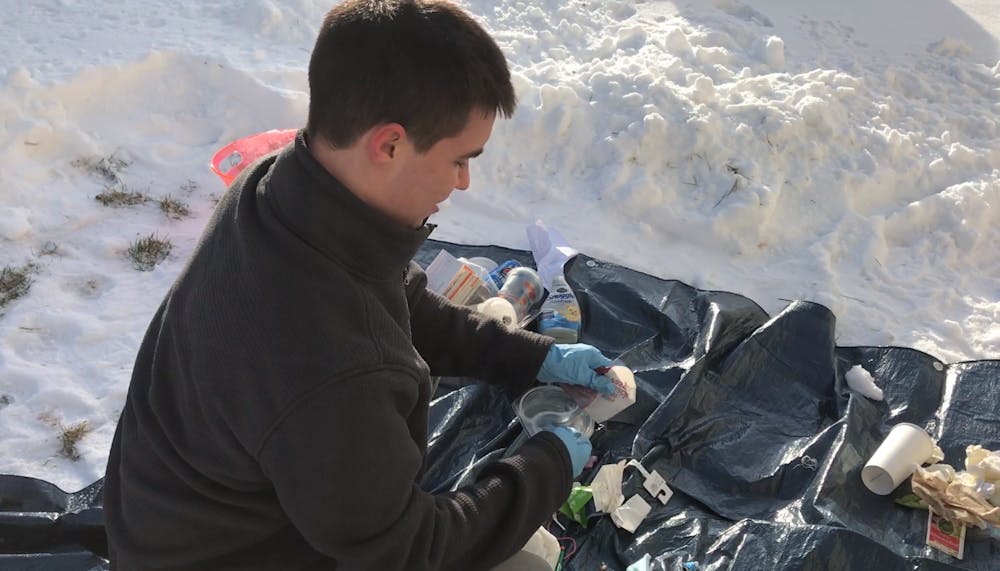Central Sustainability offers educational resources on sustainability
How sustainable is CMU?

Student sustainability coordinator Eric Urbaniak removes the non-recyclable flimsy plastic from a container that can be recycled while doing a waste audit of his dorm room garbage in this February 2021 photo.
This year Central Michigan Univeristy disposed more than 40% of waste in a healthy way, according to Eric Urbaniak, a senior and sustainability coordinator at Central Sustainability.
“That’s a huge accomplishment,” he said. “A lot of it (is) because of facilities management, but a lot of it (is) because of the education and the outreach associated with Central Sustainability and the students who care about waste reduction and environment.”
Central Sustainability workes with the CMU dining and Facilities Management to make the campus more sustainable and students more knowledgeble about the resources avaliable.
Education on Sustainability
Junior Meghan VanDamme is a sustainability coordinator at Central Sustainability. She said one of the educational resources Central Sustainability offers is a Sustainable Living Guide. It covers how to live sustainably on campus, how to recycle properly, where to recycle, which businesses are locally owned and which parks to go.
“We know that students really do care about sustainability,” VanDamme said.
According to the latest Central Sustainability Survey Record for 2021, out of 499 surveyed CMU students and faculty, 90.4% of them are familiar with a word “sustainability.” However, in another question, 47.7% of them replied that they want CMU to inform students on sustainability and environment issues more.
“We know that students want to live more sustainably, but sometimes they don’t always know how to,” VanDamme said. “That’s why we’re here and why we have our educational efforts.”
Corey Arndt is a Campus Dining senior executive chef. He said CMU Dining hired student employees who are overseeing sustainability of the dining halls. Also, CMU Dining is bringing hydroponics (cabinets with water-grown plants) to each dining hall soon to educate students on how food grows and where it comes from, he said.
“They are pretty awesome,” Arndt said. “It’s very easy to use so you can actually learn.
“In the dining halls we feel we have responsibility ... to educate our students. We’re looking at generations to come. What we do now affects future generations.”
VanDamme said in the dining halls Central Sustainability recently held waste audits to see how much students are wasting food. Students could weigh what was left on their plates after they had a meal. Central Sustainability found out that an average student per meal was wasting around two pounds of food. There was over 50 pounds of food waste produced per meal in one hour in one dining hall.
“That was just a way, again, for us to ... more impactfully educate students about their own habits,” VanDamme said.
According to the United States Environmental Protection Agency (EPA) 2021 report, Americans waste more than one third of their food supply, which means per year the U.S. wastes from 161 to 335 billion pounds of food. "This uneaten food ... contains enough calories to feed more than 150 million people each year," according to the report.
Preventing that much food waste would also save enough energy to power 21.5 million houses in the U.S., supply 29 million of the American houses with water and stop emissions of CO2 equal to 23 coal fired power plants, according to the report.
Jonathan Webb, the associate vice president of Facilities Management, said he has been amazed by the Central Sustainability students' leadership skills and educational efforts.
“If you’re holding a sheet of paper and you don’t need it anymore, you could choose to throw it away or you could choose to recycle it,” Webb said. “Central Sustainability platform really does focus on education and awareness, so more people understand that the right thing to do with that piece of solid waste is to put it in the landfill to be able to recycle it.”
For CMU students looking for resources, how and what to recycle properly, Webb recommended they visit the Central Sustainability webpage, contact the organization or get involved with a program.
What is important to know about the waste on campus?
CMU students in the dining halls produce about 15,000 pounds of food waste per week, Urbaniak said. VanDamme said “anything that’s put on a plate” in the dining halls is compostable.
CMU composts 100% of food waste from the dining facilities, he said.
“That is all composted and then brought back and used as a sort of a fertilizer ... all over campus,” he said.
According to Urbaniak, food waste is sent to Morgan Composting.
VanDamme said now students can also collect their own compost and dispose of it at the bins located in Northwest Apartments.
Webb said CMU Facilities Management operates facilities on the campus’ infrastructure such as roofs, windows, access to water and all the utilities. The department's another responsibility is to handle solid waste and recycling on campus.
Urbaniak said solid waste from CMU is recycled through the Isabella County Recycling Facility.
“There’s a finite amount of materials on our Earth,” Webb said. “The more we continue to re-use those materials, the better off it’ll be for generations to come.”
To raise awarness about the importance of sustainability and the resources availiable on campus, Central Sustainability is participating in a Campus Race to Zero Waste.
“Sustainability is everything,” Urbaniak said. “We won’t have an Earth if we don’t live sustainably, that’s why Central Sustainability really exists on campus."





